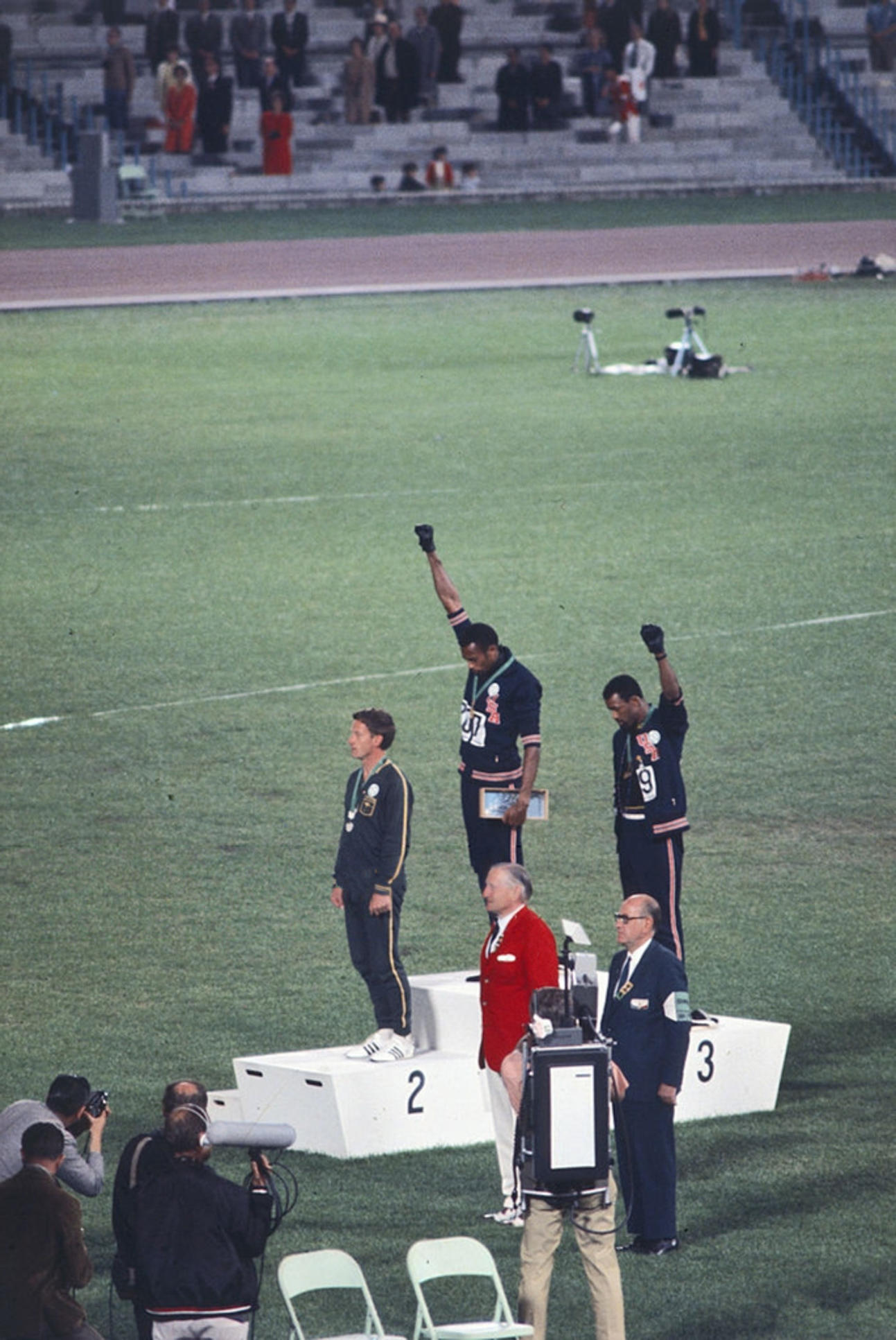White America's long history of discomfort with minority protests
And how President Trump tapped into it


A free daily email with the biggest news stories of the day – and the best features from TheWeek.com
You are now subscribed
Your newsletter sign-up was successful
When President Trump inserted himself into the debate over NFL players' symbolic protests during the national anthem, he very likely believed that he was amplifying the righteous instincts of a "silent majority" of Americans. And he's probably not wrong. Recent polls suggest that while people don't support the idea of firing athletes for these weekly demonstrations, they are turned off by them.
This is hardly surprising. The white American mainstream, to the extent that such a thing may still be said to exist, has felt irritated or threatened by minority protest movements from the civil rights era to the present day. You can see it very clearly in contemporaneous reactions to these protests.
My children's impression of Martin Luther King is the one that's been inculcated in them by elementary school teachers: courageous hero whose literal monumental status is not unlike that of the country's founders. Later in their educational careers they will learn just how besieged he was, personally and politically, at the end of his life. On MLK Day this year, historian Joshua Zeitz noted in Politico Magazine: "On the eve of his death on April 4, 1968, he was more controversial and less popular than he had been at any time in his public career. In a Gallup poll conducted in 1963, 41 percent of respondents rated him favorably, and 37 percent negatively. In 1967, just 32 percent gave him a favorable rating, whereas 63 percent viewed him negatively."
The Week
Escape your echo chamber. Get the facts behind the news, plus analysis from multiple perspectives.

Sign up for The Week's Free Newsletters
From our morning news briefing to a weekly Good News Newsletter, get the best of The Week delivered directly to your inbox.
From our morning news briefing to a weekly Good News Newsletter, get the best of The Week delivered directly to your inbox.
One year after King's assassination, during an awards ceremony at the Summer Olympics in Mexico City, the sprinters Tommie Smith and John Carlos raised their fists in a Black Power-esque salute to highlight poverty in America's inner-cities. They were met with this reaction in Time magazine: [T]wo disaffected black athletes from the U.S. put on a public display of petulance that sparked one of the most unpleasant controversies in Olympic history and turned the high drama of the games into theater of the absurd.” When they returned home, they were suspended from the U.S. track team and received death threats.
A few years later, America met an unknown actress named Sacheen Littlefeather, who was dispatched by Marlon Brando to decline his Academy Award for best actor in protest of Hollywood's (and the country's) maltreatment of Native Americans. One could easily hear the angry-white-guy ethos of Donald Trump in John Wayne's response to Brando's stunt: "If he had something to say, he should have appeared that night and stated his views instead of taking some little unknown girl and dressing her up in an Indian outfit."
Recall, more recently, last year's #OscarsSoWhite boycott. Black filmmakers and actors called for Americans to "tune out" the Academy Awards broadcast because of the industry's persistent marginalization of minority talent. Only 23 percent of Americans supported the boycott, according to a Reuters/Ipsos poll. And when some black entertainers like Ice Cube balked at the protest, he perhaps inadvertently provided cover to those who disdained these (to borrow a put-down from our latest drama) "ungrateful black multi millionaires [sic]."
Tellingly, many whites are no more receptive to protests about the plight of minorities even when they are lodged by a white man. For instance, Bruce Springsteen began performing the song “American Skin (41 Shots),” a brooding, sensitive-to-both-sides chamber piece about the shooting of an unarmed African immigrant by four New York City Police, at concerts in 2000:
A free daily email with the biggest news stories of the day – and the best features from TheWeek.com
Then-Mayor Rudy Giuliani and the city's police commissioner howled in indignation. The head of the Patrolmen's Benevolent Association urged the city's police officers to boycott Springsteen's concerts. The chief of police went so far as to withdraw Springsteen's police escort for a night.
In short, when confronted by protest from someone even higher in the social hierarchy, these powerful white men whined, called for boycotts, and retreated, however briefly, to their safe spaces. As with the Blue Lives Matter counterprotest movement, the instinctual response to any assertion of a sub-American identity is one of irritation, scorn, and outright fear.
Over time, as with MLK's legacy, some social movements eventually are vindicated. The country hears grievances. Controversy ensues. Clashes occur. The culture changes. Controversy fades. Springsteen's "American Skin" took on a sad new relevance, in 2012, after the killing of Trayvon Martin by a self-appointed neighborhood watchmen. He's been playing the song off and on ever since, and, as police shootings of unarmed minorities grab headlines, no one is offended by it anymore.
The lesson to would-be protesters is double-edged: Just because they don't like you doesn't mean you're wrong — but neither does it mean, in every case, that anything will change.
Scott Galupo is a freelance writer living in Virginia. In addition to The Week, he blogs for U.S. News and reviews live music for The Washington Post. He was formerly a senior contributor to the American Conservative and staff writer for The Washington Times. He was also an aide to Rep. John Boehner. He lives with his wife and two children and writes about politics to support his guitar habit.
-
 6 of the world’s most accessible destinations
6 of the world’s most accessible destinationsThe Week Recommends Experience all of Berlin, Singapore and Sydney
-
 How the FCC’s ‘equal time’ rule works
How the FCC’s ‘equal time’ rule worksIn the Spotlight The law is at the heart of the Colbert-CBS conflict
-
 What is the endgame in the DHS shutdown?
What is the endgame in the DHS shutdown?Today’s Big Question Democrats want to rein in ICE’s immigration crackdown
-
 The billionaires’ wealth tax: a catastrophe for California?
The billionaires’ wealth tax: a catastrophe for California?Talking Point Peter Thiel and Larry Page preparing to change state residency
-
 Bari Weiss’ ‘60 Minutes’ scandal is about more than one report
Bari Weiss’ ‘60 Minutes’ scandal is about more than one reportIN THE SPOTLIGHT By blocking an approved segment on a controversial prison holding US deportees in El Salvador, the editor-in-chief of CBS News has become the main story
-
 Has Zohran Mamdani shown the Democrats how to win again?
Has Zohran Mamdani shown the Democrats how to win again?Today’s Big Question New York City mayoral election touted as victory for left-wing populists but moderate centrist wins elsewhere present more complex path for Democratic Party
-
 Millions turn out for anti-Trump ‘No Kings’ rallies
Millions turn out for anti-Trump ‘No Kings’ ralliesSpeed Read An estimated 7 million people participated, 2 million more than at the first ‘No Kings’ protest in June
-
 Ghislaine Maxwell: angling for a Trump pardon
Ghislaine Maxwell: angling for a Trump pardonTalking Point Convicted sex trafficker's testimony could shed new light on president's links to Jeffrey Epstein
-
 The last words and final moments of 40 presidents
The last words and final moments of 40 presidentsThe Explainer Some are eloquent quotes worthy of the holders of the highest office in the nation, and others... aren't
-
 The JFK files: the truth at last?
The JFK files: the truth at last?In The Spotlight More than 64,000 previously classified documents relating the 1963 assassination of John F. Kennedy have been released by the Trump administration
-
 'Seriously, not literally': how should the world take Donald Trump?
'Seriously, not literally': how should the world take Donald Trump?Today's big question White House rhetoric and reality look likely to become increasingly blurred
